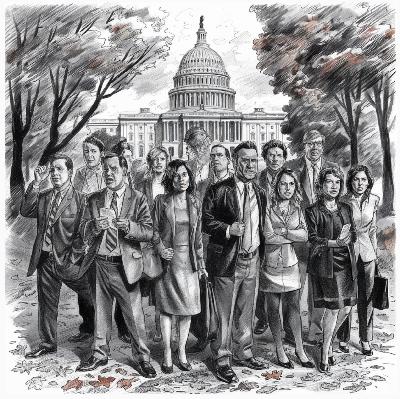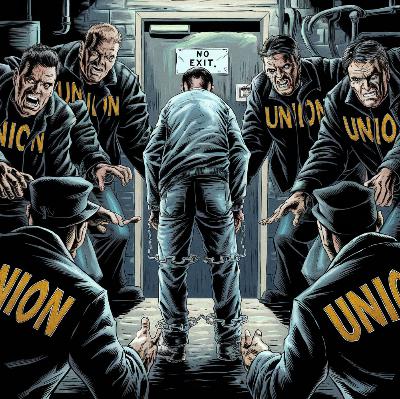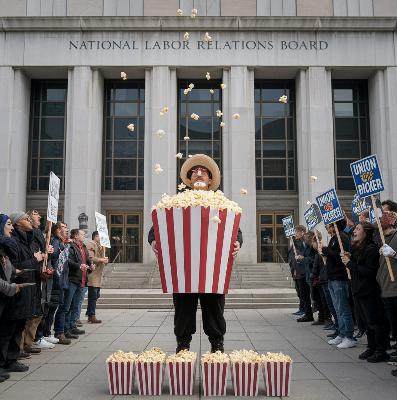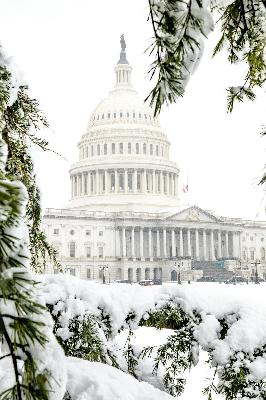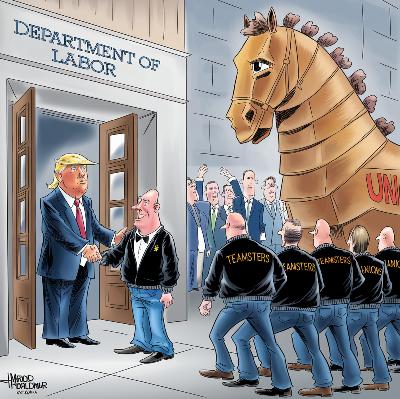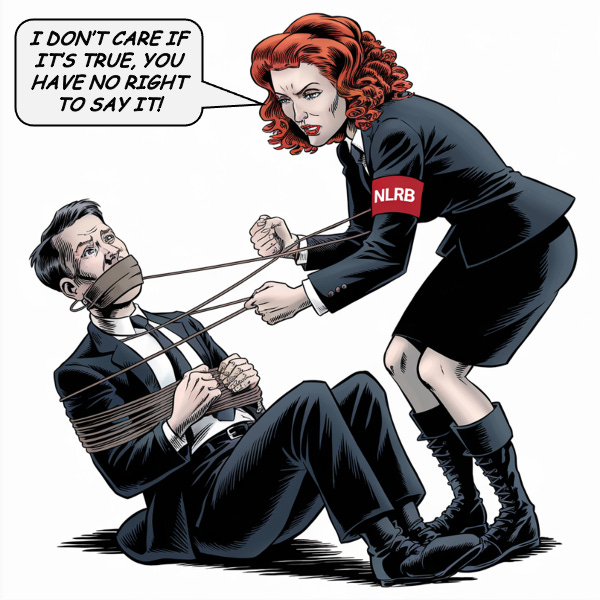Discover LaborUnionNews.com's Labor Relations Radio
LaborUnionNews.com's Labor Relations Radio

LaborUnionNews.com's Labor Relations Radio
Author: LaborUnionNews.com
Subscribed: 6Played: 127Subscribe
Share
© Axiomatic Media, LLC
Description
166 Episodes
Reverse
In the last week alone, the Trump administration has effectively shuttered the Federal Mediation and Conciliation Service, ended collective bargaining for hundreds of thousands of federal workers, two separate lawsuits filed against government unions, and union lawsuits filed against the Trump administration, as well as the re-hiring and re-firing of NLRB member Gwynne Wilcox.To say that it’s a lot to take in would be an understatement.In this episode of Labor Relations Radio, returning guest Alex MacDonald from Littler’s Workplace Policy Institute joins host Peter List to help break all of it down.Follow Alex MacDonald on LinkedIn here.Follow Alex MacDonald’s writings at the Federalist Society here.Other episodes with Alex MacDonald:* Labor Relations Radio, E161—WPI's Alex MacDonald On The Legal Theory Behind The Firing Of NLRB Member Wilcox* Labor Relations Radio, E149: An Accidental Outcome? Alex MacDonald returns to discuss how the NLRA's success has resulted in fewer unions & what might happen under a new administration in DC.* Labor Relations Radio E144—Alex MacDonald Explains How Unions' Right to"Exclusive Representation" May Be Unconstitutional* Labor Relations Radio E138 — Attorney Alex MacDonald On The Constitutionality Of 'Exclusive Representation'LaborUnionNews.com's Labor Relations Radio is subscriber-supported. To receive new posts and support our work, become a subscriber. This is a public episode. If you would like to discuss this with other subscribers or get access to bonus episodes, visit laborunionnews.substack.com
Share this episode of Labor Relations Radio with your colleagues.Kim Kavin, a freelance writer and editor, co-founder of Fight for Freelancers USA, and publisher of FreelanceBusting.com, returns to the podcast to discuss the latest happenings in the War on the Gig Economy.In this episode Kim discusses what is transpiring at the federal and state levels with respect to the efforts to fight for Americans’ right to choose how to earn a living, as well as the efforts to destroy that right.Read more about the fight against freelance busting at FreelanceBusting.comLaborUnionNews.com's Labor Relations Radio is subscriber-supported. To receive new posts and support our work, become a subscriber. This is a public episode. If you would like to discuss this with other subscribers or get access to bonus episodes, visit laborunionnews.substack.com
Share this episode of Labor Relations Radio with your colleagues.If the workers surrender control over working relations to legislative and administrative agents, they put their industrial liberty at the disposal of state agents. — Samuel Gompers, 1915On Tuesday, Sens. Josh Hawley (R-MO), as well as Sens. Cory Booker (D-N.J.), Gary Peters (D-Mich.), Bernie Moreno (R-Ohio), and Jeff Merkley (D-Ore.) introduced the Faster Labor Contracts Act—a bill that is endorsed by the Teamsters, which would put federally-mandated arbitrators in the position of dictating first-time labor contracts onto employers, employees, and unions. The Faster Labor Contracts Act would:* Amend the National Labor Relations Act to require that after workers have voted to form a union, employers must begin negotiating with the new union within 10 days.* Provide that if no agreement is reached within 90 days, the dispute will be referred to mediation.* Stipulate that if mediation fails within 30 days, or additional periods agreed upon by the parties, the dispute will be referred to binding arbitration to secure an initial contract (view more details of this provision in highlights here).* Commission a Government Accountability Office report on average workplace time-to-contract one year after enactment.Read the full highlighted bill here.“The Faster Labor Contracts Act is a massive expansion of the federal government’s authority over the private sector,” noted Kristen Swearingen, spoksperson for the Coalition for Democratic Workplace. “It would allow government bureaucrats to dictate the employment terms of workers via mandatory, binding arbitration, meaning they can set the workers’ wages, benefits, workplace safety standards, pensions, and so on with no oversight by the workers, employers, unions, or even the judicial branch.”In this episode of Labor Relations Radio, returning guest Alex MacDonald, Co-Chair of Littler’s Workplace Policy Institute, joins host Peter List to discuss the ramifications of this bill if it becomes law.Follow Alex MacDonald on LinkedIn here.Follow Alex MacDonald’s writings at the Federalist Society here.Prior Labor Relations Radio episodes with Alex MacDonald:* Labor Relations Radio, E161—WPI's Alex MacDonald On The Legal Theory Behind The Firing Of NLRB Member Wilcox* Labor Relations Radio, E149: An Accidental Outcome? Alex MacDonald returns to discuss how the NLRA's success has resulted in fewer unions & what might happen under a new administration in DC.* Labor Relations Radio E144—Alex MacDonald Explains How Unions' Right to"Exclusive Representation" May Be Unconstitutional* Labor Relations Radio E138 — Attorney Alex MacDonald On The Constitutionality Of 'Exclusive Representation'LaborUnionNews.com's Labor Relations Radio is subscriber-supported. To receive new posts and support our work, become a subscriber. This is a public episode. If you would like to discuss this with other subscribers or get access to bonus episodes, visit laborunionnews.substack.com
James F. O’Brien is a Professor of Computer Science at the University of California, Berkeley and has written about how the coming AI job apocalypse necessitates the need to look at alternative means of revenue, including taxing AI, to avoid mass societal disruption. In this episode of Labor Relations Radio, Professor O’Brien joins host Peter List to discuss how fast AI is moving into our society, the “upstream” and “downstream” effect and what they mean to all of us.Related: * The impending AI-driven jobless economy: Who will pay taxes?* The End of Required Work: Universal Basic Income and AI-Driven Prosperity* Musk predicts future without jobs due to AI and proposes high universal income This is a public episode. If you would like to discuss this with other subscribers or get access to bonus episodes, visit laborunionnews.substack.com
A lot is going on in Washington, DC these days. In this episode of Labor Relations Radio, Kristen Swearingen Vice President, Legislative & Political Affairs at the Associated Builders & Contractors, Inc. and spokesperson for the Coalition for a Democratic Workplace joins host Peter List to discuss some of the issues, including the re-introduction of the PRO Act, Sen. Josh Hawley’s “PRO Act-Lite” framework, as well as President Trump’s nominee to head the Department of Labor, Lori Chavez-DeRemer.LaborUnionNews.com's Labor Relations Radio is subscriber-supported. To receive new posts and support our work, become a subscriber. This is a public episode. If you would like to discuss this with other subscribers or get access to bonus episodes, visit laborunionnews.substack.com
If the workers surrender control over working relations to legislative and administrative agents, they put their industrial liberty at the disposal of state agents. — Samuel Gompers, 1915Mark Mix of the National Right to Work Legal Defense Foundation rejoins the podcast to discuss Lori Chavez-DeRemer, President Trump’s nominee to become the Secretary of Labor, Senator Josh Hawley’s (R-MO) efforts to “bend the knee” to unions, as well as a host of other labor-related issues.Related:* Labor Relations Radio, Ep. 28—Guest Mark Mix of the National Right to Work FoundationLaborUnionNews.com's Labor Relations Radio is subscriber-supported. To receive new posts and support our work, become a subscriber. This is a public episode. If you would like to discuss this with other subscribers or get access to bonus episodes, visit laborunionnews.substack.com
Nearly two years after his first episode on Labor Relations Radio, economist Jon Morrow returns to discuss a wide array of topics: The topics range from the return of Donald Trump to the Presidency, the national debt, artificial intelligence, new nuclear power and desalinization plants, to the impacts of TikTok, Only Fans, and AI on our culture.* Labor Relation Radio, E74—Economist Jon Morrow on Declining Birth Rates, the Advent of AI, the State of the Economy and CultureLaborUnionNews.com's Labor Relations Radio is subscriber-supported. To receive new posts and support our work, become a subscriber. This is a public episode. If you would like to discuss this with other subscribers or get access to bonus episodes, visit laborunionnews.substack.com
On Monday, President Trump terminated the employment of National Labor Relations Board (NLRB) General Counsel Jennifer Abruzzo, which was widely expected. However, what was not expected was that Trump also fired NLRB Member Gwynne Wilcox.In this episode of Labor Relations Radio, returning guest Alex MacDonald, Co-Chair of Littler’s Workplace Policy Institute, joins host Peter List to discuss the legal theory that may be behind the move.Follow Alex MacDonald on LinkedIn here.Follow Alex MacDonald’s writings at the Federalist Society here.Prior Labor Relations Radio episodes with Alex MacDonald:* Labor Relations Radio, E149: An Accidental Outcome? Alex MacDonald returns to discuss how the NLRA's success has resulted in fewer unions & what might happen under a new administration in DC.* Labor Relations Radio E144—Alex MacDonald Explains How Unions' Right to"Exclusive Representation" May Be Unconstitutional* Labor Relations Radio E138 — Attorney Alex MacDonald On The Constitutionality Of 'Exclusive Representation' This is a public episode. If you would like to discuss this with other subscribers or get access to bonus episodes, visit laborunionnews.substack.com
Mr. Edwin Egee, vice president, government relations and workforce development at the National Retail Federation. He is responsible for NRF’s policy agenda on labor, employment, immigration and health care. He manages NRF’s Employment Law and Benefits Committee.Though early in the new Trump Administration, Mr. Egee joins host Peter List to discuss the latest happenings in Washington—from President Trump’s recent moves at the National Labor Relations Board, where specific cases stand, as well as immigration, and Senator Josh Hawley’s pro-union (anti-worker) “framework” for labor law changes.Related: * Labor Relations Radio, Ep. 30—Guest: The National Retail Federation's Ed Egee on Underground Efforts To Install Electronic Voting and Card Check LaborUnionNews.com's Labor Relations Radio is subscriber-supported. To receive new posts and support our work, become a subscriber. This is a public episode. If you would like to discuss this with other subscribers or get access to bonus episodes, visit laborunionnews.substack.com
Recorded separately for YGTBFKMNews.com’s Daily News, Edward Ring, the director of water and energy policy for the California Policy Center, and Frank Ricci, a retired firefighter, battalion chief, and union president, joined host Peter List to discuss the issues involved with the fires wreaking havoc and destruction across southern California.Related: * Ricci: Like Administrative Arson, California’s Bad Ideas Spread Like WildfiresLaborUnionNews.com's Labor Relations Radio is subscriber-supported. To receive new posts and support our work, become a subscriber. This is a public episode. If you would like to discuss this with other subscribers or get access to bonus episodes, visit laborunionnews.substack.com
In a wide-ranging interview with Tucker Carlson, Teamsters’ President Sean O’Brien explained how the Democrats broke the Teamsters’ pension funds and expected to be thanked for fixing them 40 years later.In this episode of Labor Relations Radio, host Peter List revisits the Carter legacy, and how Democrats’ crusade to deregulate certain industries did more to decimate unions than Ronald Reagan ever did.Related: * Worth a Watch: The Teamsters' Sean O'Brien Interview With Tucker Carlson* The Decline of Unions, Part One: President Jimmy Carter, Union-BusterLaborUnionNews.com's Labor Relations Radio is subscriber-supported. To receive new posts and support our work, become a subscriber. This is a public episode. If you would like to discuss this with other subscribers or get access to bonus episodes, visit laborunionnews.substack.com
There have been a lot of developments at the National Labor Relations Board since the November 5th election, and with President Trump returning to the White House in November, many expect the labor law pendulum to swing back to the right after January.In this episode of Labor Relations Radio, Labor Relations Institute’s Michael VanDervort joins host Peter List to get caught up on some of the changes over the last several weeks and how the NLRB may change in the coming months and years under Trump 2.0.Related:* Michael VanDervort’s DriveThru HR podcast* Labor Relations Institute’s Left of Boom ShowLaborUnionNews.com's Labor Relations Radio is subscriber-supported. To receive new posts and support our work, become a subscriber. This is a public episode. If you would like to discuss this with other subscribers or get access to bonus episodes, visit laborunionnews.substack.com
Erik Sherman is a freelance writer who reports on business, economics, finance, investing, markets, tech, law, commercial real estate, and income and wealth inequality. His credits include Fortune, the Wall Street Journal, the New York Times Magazine, NBC News, CBS Moneywatch, Technology Review, The Fiscal Times, and Inc. He is also the author or co-author of 10 nonfiction books.In this episode, Erik joins host Peter List in the continuation of a conversation that began on X (formerly Twitter) about AI and economics.To follow Erik Sherman:* Erik Sherman at Forbes* Erik Sherman at Substack* Erik Sherman on X (formerly Twitter)Graphs mentioned in the audio. This is a public episode. If you would like to discuss this with other subscribers or get access to bonus episodes, visit laborunionnews.substack.com
On Friday evening, much to the surprise of the business community and millions of independent contractors, President-elect Donald Trump nominated a one-term Congresswoman, Rep. Lori Chavez-DeRemer (R-Ore), to become Trump’s Secretary of Labor.Despite her seeming lack of qualifications, Chavez-DeRemer’s pick is surprising to many people due to her…* Backing of the PRO Act* Support for nationalizing public-sector labor law* Reported backing of amnesty for undocumented migrantsAs the nomination was fully supported by the Teamsters’ union president Sean O’Brien, the Wall Street Journal editorial board even penned a piece entitled: Trump’s Labor Choice: Unions Over Workers.In this episode of Labor Relations Radio, Jennifer Van Laar, the managing editor of RedState.com joins host Peter List to discuss Trump’s puzzling pick.LaborUnionNews.com's Labor Relations Radio is subscriber-supported. To receive new posts and support our work, become a subscriber. This is a public episode. If you would like to discuss this with other subscribers or get access to bonus episodes, visit laborunionnews.substack.com
Teamsters President Sean O’Brien is recommending Rep. Lori Chavez-DeRemer, an Oregon Republican, to lead the Department of Labor under the incoming Trump administration.She is an odd choice for Trump to consider, given her backing of the economy-destroying PRO Act, and she has already garnered much criticism from many people and groups, including independent contractor advocates.In this episode of Labor Relations Radio, Michael Saltsman, a partner with Berman & Co. joins host Peter List to discuss what is driving the push behind Chavez-DeRemer, as well as why she would be a bad choice for the incoming Trump administration.Related: * Teamsters president pushing Chavez-DeRemer for Labor secretary * Lori Chavez-DeRemer touted for US Labor Secretary* Employers' group tees off on Chavez-DeRemer amid Labor secretary chatter* Don’t Let the Teamsters Pick the Labor Secretary* Independent Contractors Sound the Alarm: PRO-Act Sponsor Lori-Chavez-DeRemer Is Not Fit to Be Labor Secy* Make America Work AgainLaborUnionNews.com's Labor Relations Radio is subscriber-supported. To receive new posts and support our work, become a subscriber. This is a public episode. If you would like to discuss this with other subscribers or get access to bonus episodes, visit laborunionnews.substack.com
Though not unexpected, the National Labor Relations Board (NLRB) issued its long-awaited decision, which bans employers from conducting so-called “captive-audience” (aka mandatory) meetings with their employees during union organizing campaigns.In this episode of Labor Relations Radio, labor attorney Mike Carrouth, from the law firm Fisher Phillips, shares the basics in what employers are allowed and not allowed to do under this new ruling.Note: Nothing in this episode of Labor Relations Radio should be construed as legal advice. If you, as an employer, have union-related questions or issues, please seek advice from a labor attorney.LaborUnionNews.com's Labor Relations Radio is subscriber-supported. To receive new posts and support our work, become a subscriber. This is a public episode. If you would like to discuss this with other subscribers or get access to bonus episodes, visit laborunionnews.substack.com
Employers and their agents beware…Last week, the National Labor Relations Board (NLRB) issued a decision in Siren Retail Corp d/b/a Starbucks, overruling Tri-Cast, Inc., 274 NLRB 377 (1985) and clarifying the test that the Board will use to evaluate whether employer predictions about the impact of unionization on the relationship between individual employees and their employer are unlawful threats. Under the new ruling, if an employer (or its agents) does not carefully parse out their statements to employees regarding Section 9(a), moving forward, the NLRB will now find that the employer has issued a threat.In this episode of Labor Relations Radio, Phil Wilson, President of LRI Consulting Services, Inc. (LRICS) and Approachable Leadership, returns to the podcast to discuss the ramifications of the NLRB’s new decision, as well as what is ahead with a new NLRB under Trump 2.0.Prior episodes with Phil Wilson:* Labor Relations Radio E129—LRI's Phil Wilson on an NLRB ALJ's Outrageous Ruling Against Free Speech* Labor Relations Radio, E97—LRI's Phil Wilson & Michael VanDervort on the new Left of Boom podcast* Labor Relations Radio, Ep. 64—LRI's Phil Wilson on Recent NLRB Developments and Union Organizing Trends* Labor Relations Radio, Ep. 40—LRI's Phil Wilson on the State of the Post-Pandemic WorkplaceLaborUnionNews.com's Labor Relations Radio is subscriber-supported. To receive new posts and support our work, become a subscriber. This is a public episode. If you would like to discuss this with other subscribers or get access to bonus episodes, visit laborunionnews.substack.com
With the election of Donald Trump to become the 47th President of the United States, both employers and unions should expect yet another pendulum swing in labor law.In this episode of Labor Relations Radio, returning guest Jon Hyman, a shareholder with Wickens Herzer Panza shares some insights as to what we might see coming in 2025.Related Links:* Jon Hyman’s Ohio Employer Law Blog* Jon Hyman on LinkedIn.com* The Norah and Dad Show* Labor Relations Radio, Ep. 18: Guest—The 'Master of Workplace Schadenfreude,' Attorney Jon Hyman on why 'anti-union doesn't mean anti-worker'* Labor Relations Radio, Ep. 21—Guest: Attorney Jon Hyman On What HR Can Take Away From The NLRB's Starbucks Complaint* Labor Relations Radio, Ep. 36: Guest Jon Hyman on Weingarten Rights, What They Are And How They're Likely Coming Back To Non-Union Workplaces* Labor Relations Radio, E86—Guest Jon Hyman on the Existential Impact of Artificial IntelligenceLaborUnionNews.com's Labor Relations Radio is subscriber-supported. To receive new posts and support our work, become a subscriber. This is a public episode. If you would like to discuss this with other subscribers or get access to bonus episodes, visit laborunionnews.substack.com
With the November 5th elections right around the corner, employers and unions alike are girding themselves for what could be a very consequential outcome.In this, the 150th episode of Labor Relations Radio, labor attorney and returning guest Cary Burke joins host Peter List to discuss Elon Musk’s recent victory at the Fifth Circuit over an old tweet, as well as potential labor relations outcomes if Kamala Harris or Donald Trump win the presidency.Other Labor Relations Episodes with Cary Burke:* Labor Relations Radio, E95—Seyfarth Shaw's Cary Burke on the 'retroactivity' of Cemex Bargaining Orders and more* Labor Relations Radio, E130—Attorney Cary Burke on a Potential Cemex Bargaining Order At Mercedes & 'Spying' on LinkedIn LaborUnionNews.com's Labor Relations Radio is subscriber-supported. To receive new posts and support our work, become a subscriber. This is a public episode. If you would like to discuss this with other subscribers or get access to bonus episodes, visit laborunionnews.substack.com
“It is declared to be the policy of the United States to eliminate the causes of certain substantial obstructions to the free flow of commerce and to mitigate and eliminate these obstructions when they have occurred by encouraging the practice and procedure of collective bargaining and by protecting the exercise by workers of full freedom of association, self- organization, and designation of representatives of their own choosing, for the purpose of negotiating the terms and conditions of their employment or other mutual aid or protection.” — National Labor Relations ActLabor attorney Alex MacDonald from Littler’s Workplace Policy Institute returns to the podcast to discuss his article The Accidental Success of the NLRA: How a Law about Unions Achieved Its Goals by Giving Us Fewer Unions.Read more of Alex’s writings at the Federalist Society here.* Labor Relations Radio E144—Alex MacDonald Explains How Unions' Right to"Exclusive Representation" May Be Unconstitutional* Labor Relations Radio E138 — Attorney Alex MacDonald On The Constitutionality Of 'Exclusive Representation'LISTEN TO AND SUBSCRIBE TO THE YGTBFKM PODCASTLaborUnionNews.com and Labor Relations Radio are subscriber-supported. To receive new posts and support our work, please consider becoming a paid subscriber. This is a public episode. If you would like to discuss this with other subscribers or get access to bonus episodes, visit laborunionnews.substack.com






